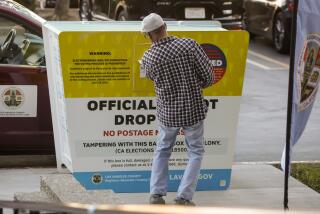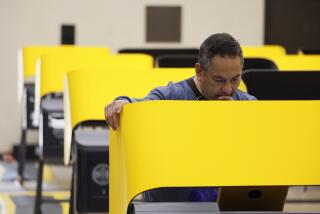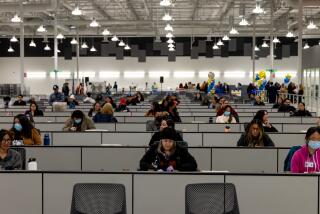Bipartisan presidential panel suggests ways to improve elections
WASHINGTON — States should allow online voter registration and create more opportunities to cast ballots before election day, according to a report issued Wednesday by a bipartisan commission formed to address long lines and other troubles at the polls in 2012.
The Presidential Commission on Election Administration made its recommendations in a 112-page report to President Obama. The commission — led by longtime Washington attorneys Robert F. Bauer, a Democrat, and Benjamin L. Ginsberg, a Republican — declared that no one should wait more than 30 minutes to vote and warned of an “impending crisis” as electronic voting machines age.
Obama created the group last spring after lines, machine malfunctions and confusion left some voters waiting hours. In his inaugural address at the start of his second term, he called for a panel to find ways to improve the “efficient administration” of elections.
The commission stayed true to that prescribed mandate, experts said, largely steering clear of the more contentious debates. The report does not wade deeply into issues involving voter fraud or suppression, voter identification laws or protection for minorities after the Supreme Court struck down part of the landmark Voting Rights Act of 1965.
“Our aim was to transcend partisan divisions and view election administration as public administration that must heed the expressed interests and expectations of voters,” Bauer, counsel to Obama’s campaigns, and Ginsberg, counsel to Republican Mitt Romney’s presidential campaigns, said in a statement.
The panel focused its six-month study on bringing efficiency to voting and devising pragmatic solutions for better “customer service” at the polls. The report is accompanied by online tools to help local officials learn how to predict turnout and allocate resources. Panel members heard from election officials on ballot design and poll worker training. They consulted Disney theme park officials on how to manage long lines.
The report makes “very sensible recommendations on issues for which there’s mostly common ground among Republicans and Democrats,” said Richard L. Hasen, an election expert and law professor at UC Irvine.
Still, where the commission touched hot-button subjects, its recommendations are likely to become political fodder.
The endorsement of online voter registration will challenge some Republicans who have opposed the practice, citing concerns over fraud. The commission found that in the 24 states where either partial or complete online registration is allowed, the practice saves money, is accurate, reduces congestion at the polls and has “earned high confidence among voters, as well as support among election officials.”
The commission issued a similar endorsement of early voting, a practice that is seen as benefiting Democrats and that some Republicans have sought to curtail. The commission declared flatly that “early voting is here to stay” and urged states to offer voters a choice on when to vote. The report, however, did not expressly back in-person early voting over mail-in absentee voting. The latter is often viewed as favored by Republican voters.
As for voter fraud, the commission concluded it is “rare, but when it does occur, absentee ballots are often the method of choice.” It also urged state registrars to regularly update and cross-check voter lists with other states, a practice that would make rolls more accurate and less subject to fraud, the report said.
The panel members noted that the problems they uncovered — including disorganization, poorly designed ballots and bad planning — disproportionately affect certain groups, including military voters overseas, voters who speak limited English and voters with disabilities.
The panel recommended that local officials provide bilingual poll workers to “any polling place with a significant number of voters who do not speak English” and called for regular audits of polling places to test whether they are accessible to disabled voters.
The commission also sounded an alarm about what it described as a looming disaster. Thousands of electronic voting machines bought after the Florida recount in the 2000 presidential election are wearing out, and no plan exists to replace them.
“Simply put, their shelf life is about to expire, and so there’s no federal money. There’s no $3-billion appropriation on the horizon,” said Ginsberg, speaking at a presentation later in the day. “That is going to be a problem every bit as great as what we swore after Florida would never happen again.”
The commission did not, however, call for more federal spending to update equipment. The panel was not asked to write legislation and left it to federal, state and local officials to implement its suggestions.
As he received the recommendations at the White House, Obama said he would advocate for the changes.
“We intend to publicize this and to then reach out to stakeholders all across the country to make sure that we can implement this, in part because one of the troubling aspects of the work that they did was hearing from local officials indicating that we could have even more problems in the future if we don’t act now,” Obama said.
The report also was praised by outside groups, although some called for more sweeping change.
“The commission’s recommendations are a significant step forward,” said Wendy Weiser, director of the Democracy Program at the Brennan Center for Justice. “However, more must be done to make sure the voting system works for all Americans. We need to fix the Voting Rights Act.”
kathleen.hennessey@latimes.com
More to Read
Start your day right
Sign up for Essential California for news, features and recommendations from the L.A. Times and beyond in your inbox six days a week.
You may occasionally receive promotional content from the Los Angeles Times.







